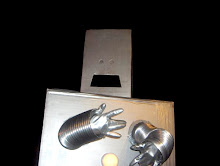 The one nice thing about being a student is the attrocious diet of trans-saturated garbage and alcohol. I remember when the CBC's Street Cents did a scientific analysis of Cheese Whiz to determine if it were food, or just melted orange trash bags. As it turns out it's actual cheese.
The one nice thing about being a student is the attrocious diet of trans-saturated garbage and alcohol. I remember when the CBC's Street Cents did a scientific analysis of Cheese Whiz to determine if it were food, or just melted orange trash bags. As it turns out it's actual cheese. Pringles in the UK recently came under the same scrutiny. What surprised me wasn't that people couldn't tell if Pringles counts as actual food, but that the Procter and Gamble (the parent company) was pissed to find out it was. Turns out, P&G were kind of hoping their crispy tube snacks would be scientifically labelled as some kind of fried-preservative novelty snack rather than actual food so they could avoid an avalanche of UK taxes. Also turns out, that pringles are made of 42% potato, and thus, counts as a potato-based chip.
 Around the world, parents send their children "care packages" loaded with fresh undies and comfort foods. In Japan they love to include copious sugar-fried study fuels, so Nestle jumped on board with the Japanese postal syste to create mailable Kit Kat bars with inscription areas and a space for postage. The candygram won the Media Grand Prix at the recent Cannes Lions International Advertising Festival. Kit Kat in Japanese is Kitto Katso, and it means "surely win".
Around the world, parents send their children "care packages" loaded with fresh undies and comfort foods. In Japan they love to include copious sugar-fried study fuels, so Nestle jumped on board with the Japanese postal syste to create mailable Kit Kat bars with inscription areas and a space for postage. The candygram won the Media Grand Prix at the recent Cannes Lions International Advertising Festival. Kit Kat in Japanese is Kitto Katso, and it means "surely win". What I'm not clear about is what the other 58% of Pringles are made out of (recycled bike spokes or something) and how you get a Kit Kat through the mail in a country as hot as Japan without making those fresh undies look like the morning after.








